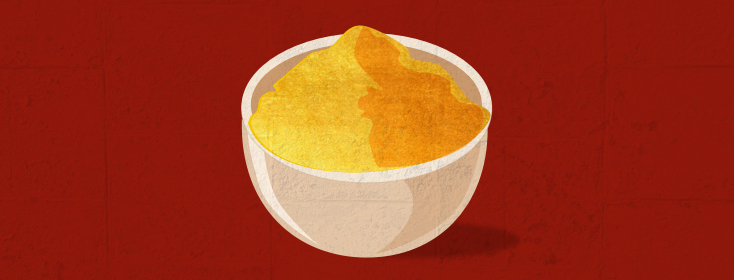Turmeric And Your Gut: Will This Golden Spice Help Your IBS Symptoms?
It is not uncommon for people living with IBS to incorporate complementary alternative therapies such as traditional Chinese medicine and herbal products as a part of their IBS treatment. Many of these therapies make strong claims about resolving IBS symptoms and more research is being done to determine how effective they are, which is great. I think integrating complementary and traditional medicine into our system is such an asset!
Turmeric, a plant from India and Southeast Asia, is a relative to ginger. It is not only a cooking spice but has a long resume of use within complementary and alternative medicine, including in the treatment of gut problems and inflammatory conditions.1
So – is the golden spice really worth its weight when it comes to resolving your IBS pains?
What are the benefits of turmeric?
Turmeric has been used for its anti-inflammatory, anti-oxidant, and anti-spasmolytic effects, which theoretically may help in treating inflammation and gut motility symptoms in IBS (in a similar way to peppermint and ginger). It is also thought to improve depression and anxiety, both of which can impact IBS through the brain-gut relationship.1
The therapeutic effect of turmeric has mostly been attributed to a component in the spice called curcumin, but there are other active components in the spice that may be relevant.1
IBS and turmeric research
There are mixed results on curcumin’s effectiveness in improving IBS symptoms.2-7
While some studies have demonstrated a positive impact of curcumin supplements on IBS symptoms, others demonstrate no impact compared with a placebo (control) group. It’s important to remember when you’re looking at a study that an estimated 1 in 3 positive results is due to the placebo effect – people thinking symptoms are occurring because they expect them to. So when studies occur without a control group, it’s difficult to tease out whether the benefits were placebo-related or not.2-7
An interesting animal study examined the impact of curcumin on IBS by regulating neurotransmitters (brain-signaling chemicals) related to depression and anxiety that are known to impact the gut and found a promising effect of curcumin supplementation.7
Because there are few studies on turmeric, there are definitely some research limitations. One of the BIG ones that stood out to me was that the studies use different preparations of turmeric supplements, which makes it difficult to compare results.2-7
Some studies used a control group to control for the placebo effect, whereas some did not. The species of turmeric could also have impacted the effectiveness of the spice as a treatment for IBS. As well, with some studies showing positive results, and others showing negative results – you have to wonder what the role of the variance in microbiomes play in the results.2-7
Ultimately, more research is needed to clarify whether taking turmeric as a supplement can alleviate IBS symptoms, and is safe.
Key takeaways on turmeric for IBS
While the properties of turmeric suggest it may benefit people with IBS, the jury is out on whether turmeric will help resolve your IBS symptoms. Turmeric used as a spice in cooking is considered safe and adds flavor and color that may be therapeutic for the body, mind, and soul.
As a food-first dietitian, I say feel free to cook with it, use it in smoothies, curry dishes, and rice bowls to get those positive antioxidants in! However, I would caution against supplemental doses at this point. The evidence is unclear, and the long term safety isn’t established.
The fact is, we don’t know with confidence what dose, if any, will help your IBS symptoms. While turmeric taken as an herbal supplement is generally considered safe, it is important to talk with your doctor before trying it. We often only think of the good that can come out of taking herbs in medicinal doses. However, we have to remember that there may be consequences as well.
Community Poll
Does your IBS prevent you from attending public events?

Join the conversation